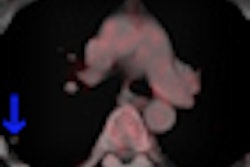
NEW YORK (Reuters Health) - Radiotherapy after surgery for head and neck mucosal melanoma (HNMM) can help prevent local spread of the disease, according to a retrospective study from France.
The study covered 160 patients treated over 28 years at 13 centers in the Groupe d'Etude des Tumeurs de la Tete et du Cou (GETTEC). It's the largest analysis to date of this rare cancer, according to lead author Dr. Adil Benlyazid of the Claudius Regaud Institute in Toulouse and colleagues.
HNMM accounts for 3% of melanoma cases and 0.4% to 10% of melanomas of the head and neck, the researchers said in the December Archives of Otolaryngology and Head and Neck Surgery.
Treatment typically involves surgery with or without postoperative radiotherapy, or radiotherapy alone if surgery is not feasible. Previous studies involving fewer subjects (i.e., 59 and 69 patients) found a benefit to adjuvant radiotherapy, but "there remains great skepticism, mostly among head and neck surgeons," according to Dr. Benlyazid and colleagues.
Between 1980 and 2008, 82 HNMM patients had surgery at the GETTEC hospitals, and another 78 had surgery followed by radiotherapy. There was a nonsignificant trend toward more locally advanced tumor stage in patients who had adjuvant radiation.
Overall and relapse-free survival didn't differ between the two groups.
But the radiotherapy patients were significantly less likely to have locoregional recurrence as a first event, with a five-year cumulative rate of 55.6% with surgery alone versus 29.9% with surgery plus radiotherapy.
After adjustment for tumor stage, the authors found a 69% lower risk of locoregional recurrence with postoperative radiotherapy (p < 0.01).
Distant metastases as a first event were more common in patients who had radiotherapy -- 40.7% versus 17.9% at five years (HR 4.17; p < 0.01) -- a finding the authors attribute to the more advanced tumors in those patients.
The increased likelihood of distant metastases with postoperative radiotherapy was "probably not a true indication of a higher distant recurrence rate in the SRT group but simply a consequence of the lower rate of locoregional recurrences as a first event," the authors wrote. "The patients who did not receive radiotherapy, however, had a higher incidence of locoregional recurrences as a first event that concealed the true frequency of distant metastases."
The only way to confirm the influence of radiotherapy on survival, Dr. Benlyazid and colleagues say, would be a randomized trial. The rarity of these tumors, however, makes such trials difficult to conduct.
They conclude: "Even in the absence of a demonstrated survival benefit, postoperative radiotherapy is strongly recommended and has clinically significant improvement of local control."
Source: http://link.reuters.com/cez34r
Arch Otolaryngol Head Neck Surg 2010;136:1219-1225.
Last Updated: 2010-12-31 13:10:23 -0400 (Reuters Health)
Related Reading
'Incurable' skin cancers may be amenable to radiation plus stem cell transplant, April 6, 2010
RT for high-risk melanoma patients reduces lymph node recurrence, November 3, 2009
US can predict survival of melanoma patients, September 25, 2009
Melanogenesis inhibition sensitizes melanoma cells to radiotherapy, October 6, 2008
Radioimmunotherapy targets metastatic melanoma lesions in phase I trial, July 2, 2008
Copyright © 2011 Reuters Limited. All rights reserved. Republication or redistribution of Reuters content, including by framing or similar means, is expressly prohibited without the prior written consent of Reuters. Reuters shall not be liable for any errors or delays in the content, or for any actions taken in reliance thereon. Reuters and the Reuters sphere logo are registered trademarks and trademarks of the Reuters group of companies around the world.



















